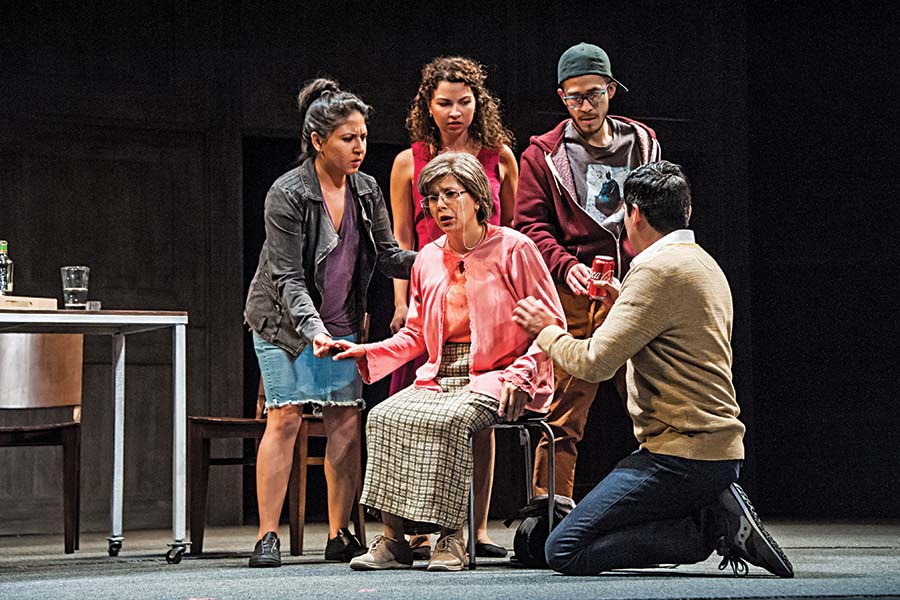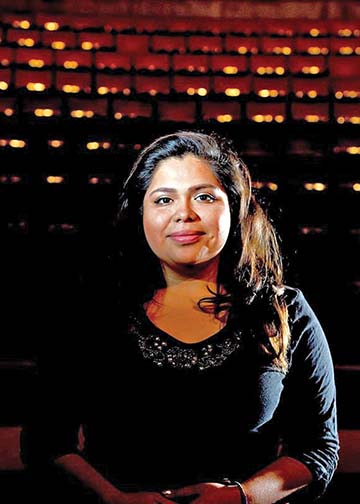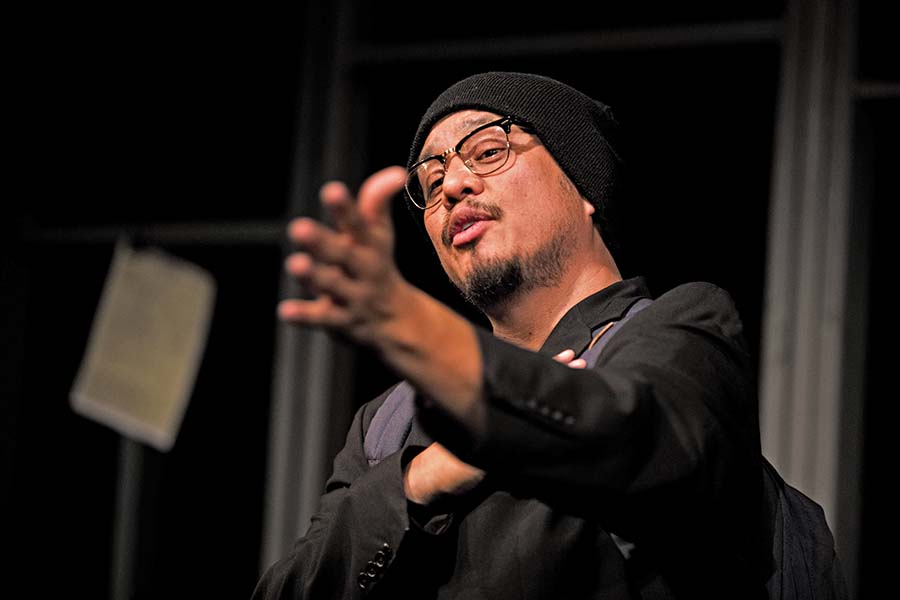“Have you ever been in love?” asked Alex Alpharaoh. “Do you remember the first time you looked into the eyes of your lover and felt that overwhelming warmth and that sense of intimate connection, and you knew without knowing?” I said yes as I blushed over the phone, and Alpharaoh continued: “That’s what it feels like on an exponential level.”
He was describing what it feels like to be onstage. Alpharaoh is a writer and performer based in Los Angeles who knew he wanted to be an artist when he was 4 years old and saw Michael Jackson perform on television. Performance has been a passion he credits with saving him from a life of gangs and crime. “By the time I was 18, I’d been to more funerals than graduations,” he said. Acting became a matter of survival, and his love for the arts led him to become a theatre professional, and a founding member of the L.A.-based company Urban Theatre Movement.
But there’s one catch: Alpharaoh is undocumented—one of an estimated 3.6 million immigrants brought to the U.S. as children, known popularly as “DREAMers,” whose careers, and the very foundation of their lives, are in constant threat of changing overnight.
Alpharaoh’s mother left her native Guatemala at age 15, carrying her 3-month-old baby as she traversed the Mexican desert by foot. She raised her boy in Echo Park and South Los Angeles, constantly reminding him that the security of their lives there depended on them guarding the secret of their immigration status. “I didn’t understand how serious it was,” Alpharaoh explained. “I was told not to say anything, not to tell people I didn’t have these elusive papers everybody had.”
Three decades later, though, he told his story in WET: A DACAmented Journey, a play he developed and performed in 2017 at Ensemble Studio Theatre in Los Angeles. That piece arose from Alpharaoh’s need to make sense of what was happening in his life at the time.
In 2012 he heard about DACA (Deferred Action for Childhood Arrivals), President Obama’s immigration policy, which allowed some individuals who arrived in the United States as children and remained in the country illegally to obtain a work permit, a Social Security number, and a renewable two-year period of deferred action from deportation, if they met certain criteria. At first, Alpharaoh was hesitant to apply, as when the program was announced details appeared murky. He consulted with legal advisors, friends, and family, who all told him DACA was the “real deal,” and he applied. The program is still registering applicants due to judicial injunctions, which have held off President Trump’s order to rescind DACA last fall. As of press time, wrangling in Congress over a legislative fix seems to have stalled, leaving the future of the program—and the hundreds of thousands of young people it covers—in an awkward limbo.
“[There’s a] misconception that DACA is some sort of amnesty,” explained Diego Salinas, a senior at James Madison University in Virginia, who like Alpharaoh is a DACA recipient working in theatre. Salinas called DACA a “Band-Aid solution,” and said he wishes people would understand that he doesn’t get to go to college for free, live off food stamps, or get free housing from the government. In fact, he pointed out, his status means he “can’t even apply for financial aid for college.”

Growing up, Salinas thought he’d be a lawyer, until he fell in love with acting after doing Tartuffe in high school. That’s also around the time he discovered his undocumented status—his parents had brought him to the States from El Salvador in 2001, when he was 5. The news left him angry and hurt, even as he understood that his parents had left their home country to give him and his two younger siblings a better future. Like many other DREAMers, Salinas realized he was undocumented when he was planning for his future after high school.
Many DACA recipients come from families who left countries with high levels of illiteracy, most of them in Latin America, and arrived in the U.S. with the hopes that their children would have opportunities that were nonexistent where they came from. Liz Magallanes’s mother, for instance, left Mexico with nothing higher than a fifth-grade education, but worked her entire life so her daughter could have more than she did. “She’s extraordinary—she’s a housekeeper, and has sacrificed everything for her children,” said Magallanes, who is based in Dallas. It was witnessing her mother’s struggle that inspired Magallanes to become an actor, she said: “I want to tell stories of the lives we don’t get to see. Uplifting the ordinary would be wonderful, because those stories deserve to be told.”
Magallanes recalled the first time she saw a Latinx character on television, and explains how once she pursued theatre as a career, she encountered yet another obstacle: the lack of diversity in the art form.

“I was the only Latina in the theatre department, in a school that was 80 percent Latino,” she said. “I realized that the arts were no different than any other sphere. It was important for me to represent people who looked like me.”
Needless to say, lack of representation is a prevalent issue among Latinx DREAMers. And some have used their own stories and struggles with immigration to inspire their art.
“I wrote Como Una Box De Chocolate, a play about the aftermath of realizing I was undocumented,” said Amalia Rojas, a Mexican playwright based in New York City. “My mother came to a reading, and she was proud, but also shocked it was so autobiographical. She started telling people, ‘Don’t say anything in front of Amalia because she’ll write about it.’ We have a very dark sense of humor; we alleviate the sadness and the pain by laughing at it,” she added with a chuckle.
Rojas said she started dreaming of seeing her own name on a Broadway marquee after her mother saved for months to buy them tickets to see Mamma Mia! for Rojas’s fifth-grade graduation. She majored in political science and playwriting at CUNY Lehman College, and trained at HB Studio and Vassar’s Powerhouse Theater, where she said she felt self-conscious about being the only playwright who seemed to be writing about her own life. But, she reasoned, “If I don’t write, I can’t complain about the lack of representation.”

For many DACA-mented people, the xenophobia and anti-immigration stance of the Trump Administration has led them to ponder the existential question: What is it to be American? Carlos Ibarra’s parents left Cuernavaca, Mexico, when he was a toddler. His father left first, then his mother, and for a few months he and his siblings lived with aunts and uncles, until his parents were able to bring them to the U.S. when he was 4.
Ibarra has no recollection of Mexico, though. As he put it, “I was always aware that I was born in Mexico, but I felt American; for me home was California, though I knew my roots were Mexican.” Growing up on a mix of telenovelas and Jean-Claude Van Damme films, Ibarra longed to be the protagonist of the stories he so loved. “I understand why labels exist, but in my own belief I’ve never allowed myself to have labels or identifiers limit what I can or can’t do. When I saw Michael J. Fox in Back to the Future I didn’t see a white guy, I saw a cool story about a teenager traveling in time,” he said. So he became an actor.
Learning of his immigration status thus felt like a dissonance, he said. “Emotionally it didn’t compute. I understood in terms of law and logistics, but not emotionally.” He continued: “I was very hopeful that something would change, that because of the way I’d been living my life that the rules would bend for me.” But in 2016 Ibarra set out to be that change, embarking on a journey to help him understand the country that seemed to be less tolerant than he’d wished for. In his documentary web series “Run Carlos Run,” Ibarra chronicled his cross-country journey, à la Forrest Gump, from his home in Brooklyn to Costa Mesa, Calif., where he grew up.
“It was the first time in my life where I felt like I was the other,” he said. “I’d go to places like Missouri or Kansas, and I’d walk into places and be the only person of color.” But what surprised him most was the lack of tension he encountered. “Everyone was so nice; people offered to help. In Ohio this lady who was driving pulled over near me, went to her trunk, and pulled out a water bottle to give it to me,” he recalled. Another time “a police car pulled over, asked if I was the guy who’s running, and asked me to let them know what highways I’d take so they could let the towns ahead know in case I needed assistance.”

Recently the media has seemed to concentrate efforts on homogenizing or valorizing DACA recipients, creating the false sense that they all fit a certain profile or that they’re all “model citizens”—people who deserve to be in America because of their saintly qualities or their heroism. Though it’s an understandable counterpoint to the implication of many restrictionist demagogues that all immigrants are law-breakers, it’s an oversimplification that can be dehumanizing and flattening of difference.
“Just as we say, don’t lump everyone as a criminal, we can’t lump everyone as a perfect example of DACA,” said Ibarra. Rojas agreed: “My brother is the opposite of me—he didn’t want to go to school. Some people aren’t made for school, and that’s okay. Maybe he wants to become an electrician or a plumber. I’d like to see the media portray people like him too.”
What Alpharaoh, Rojas, Ibarra, Salinas, and Magallanes have in common is their hope that Congress will finally pass legislation that will make their legal status permanent.
“We can talk about it all we want, but unless we put pressure on representatives we won’t see any change,” said Salinas, who in the meantime is working on creating a solo show about DACA. “I’m trying to channel that frustration into dialogue, but also action.”
Said Alpharaoh, “I don’t identify with the circumstance, I am not the circumstance—I am a human being who happens to be undocumented and a Latino. You can label me however you want, but that doesn’t change my humanity.” Change is on his mind, though: “If we don’t demand change from the country we’ve worked in and for, we won’t get what we need,” he reasoned. “We need to change the culture of secrecy and fear. There’s nothing stopping the current administration from sending ICE to my house.”
Besides her work as an actor, Magallanes is part of Mi Familia Vota, an organization that advocates for immigrants’ rights, and whose efforts have recently become focused on registering Latinx voters who have been historically absent from the democratic process. While she too is “waiting for the other shoe to drop with this administration,” she said she was grateful to “discover a group of people outside of the arts who were in the movement.”
While Rojas’s DACA status expired at the end of March, she re-applied and is now “playing the waiting game,” as she called it. Like other DREAMers and their advocates, she’d like a more lasting fix.
In the meantime she keeps on writing. “I hate the word ‘DREAMer,’ because we don’t dream, we do—we’re badasses. I like to say I’m a doer.”
Jose Solís, a Honduran writer based in New York City, is the chief theatre critic on StageBuddy.com and is featured on the American Theatre web series Token Theatre Friends.


